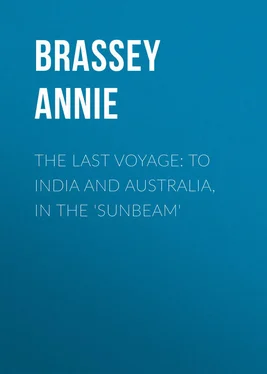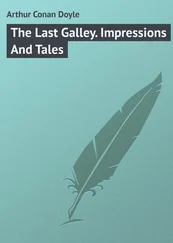Annie Brassey - The Last Voyage - To India and Australia, in the 'Sunbeam'
Здесь есть возможность читать онлайн «Annie Brassey - The Last Voyage - To India and Australia, in the 'Sunbeam'» — ознакомительный отрывок электронной книги совершенно бесплатно, а после прочтения отрывка купить полную версию. В некоторых случаях можно слушать аудио, скачать через торрент в формате fb2 и присутствует краткое содержание. ISBN: , Издательство: Иностранный паблик, Жанр: foreign_antique, foreign_prose, на английском языке. Описание произведения, (предисловие) а так же отзывы посетителей доступны на портале библиотеки ЛибКат.
- Название:The Last Voyage: To India and Australia, in the 'Sunbeam'
- Автор:
- Издательство:Иностранный паблик
- Жанр:
- Год:неизвестен
- ISBN:http://www.gutenberg.org/ebooks/29778
- Рейтинг книги:3 / 5. Голосов: 1
-
Избранное:Добавить в избранное
- Отзывы:
-
Ваша оценка:
- 60
- 1
- 2
- 3
- 4
- 5
The Last Voyage: To India and Australia, in the 'Sunbeam': краткое содержание, описание и аннотация
Предлагаем к чтению аннотацию, описание, краткое содержание или предисловие (зависит от того, что написал сам автор книги «The Last Voyage: To India and Australia, in the 'Sunbeam'»). Если вы не нашли необходимую информацию о книге — напишите в комментариях, мы постараемся отыскать её.
The Last Voyage: To India and Australia, in the 'Sunbeam' — читать онлайн ознакомительный отрывок
Ниже представлен текст книги, разбитый по страницам. Система сохранения места последней прочитанной страницы, позволяет с удобством читать онлайн бесплатно книгу «The Last Voyage: To India and Australia, in the 'Sunbeam'», без необходимости каждый раз заново искать на чём Вы остановились. Поставьте закладку, и сможете в любой момент перейти на страницу, на которой закончили чтение.
Интервал:
Закладка:
The next morning (Thursday, February 17th) we were all rather late – that is to say, for this part of the world. Personally, I began to work between seven and eight o'clock, and consequently got through a good deal before breakfast. Afterwards a succession of visitors arrived, friendly, complimentary, and on business, among the latter being many tradesmen, anxious to press their wares upon us. The verandah was soon crowded by box-wallahs, who squatted in the midst of their piles of brilliantly coloured silks, gauze, and muslins, or arrived laden with specimens of heavy lacquered-work, carved ivory, sandal-wood, Poonah inlaid work, arms, and jewels. A verandah at the back of the chief bungalow, containing the reception-rooms, had meanwhile been completely filled by a long table, on which was displayed a magnificent collection of jewels belonging to a well-known jeweller and diamond merchant. Brilliants of the size of walnuts were there by the dozen, side by side with huge emeralds; bracelets composed of hundreds of shining gems; a tiara of diamonds formerly belonging to the Empress of the French; rings with precious stones of such dimensions that none but a large finger could wear them; and altogether such a mixture of Oriental and European splendour, and ancient and modern fashions, as one would scarcely have imagined it possible to collect together. We made no purchases, but the wealthy jeweller was quite pleased to have the opportunity of displaying his splendid wares. A compliment from the Governor seemed to satisfy him completely; and before we had been five minutes at lunch the whole of his valuable stock was stowed away in two or three common-looking little boxes, tied up in cloth, and so transported back to his strong box. I do not profess to be a judge of jewels, but those who knew more of such things than I did estimated the value of the collection at over a million sterling.
Early in the afternoon I had to hurry off to the yacht to receive a large party on board. In the evening a ball was given by the Governor at Malabar Hill. It was a brilliant entertainment in celebration of the Jubilee.
Everything had been well arranged: the drawing-room with its perfect floor formed a beautiful ball-room, whilst in both verandahs stood plenty of sofas and lounges. On each side of the house the garden paths leading to the water's edge were illuminated, fireworks being discharged from boats at intervals. The ships in the harbour were also dressed with fire instead of bunting. Above all, the air felt deliciously cool. On one side of the house bountiful supper-tables, decorated with large baskets of flowers, had been laid out under awnings spread beneath the trees. The band was perfect, and though the ball was by no means over at that hour, it must have been quite three o'clock before we all retired.
On Friday, February 18th, we had another busy morning, making various arrangements for sea. Mr. McLean had been pronounced well enough to go home by to-day's P. & O. steamer, which he was anxious to do, for he is to row in the Oxford Eight. Pratt, the steward, who has been with us during our journey through India, has been unwell for some time past, and is therefore recommended by the Doctor to return at the same time. We had always intended to send home my dear and clever poodle 'Sir Roger' from Bombay; his place on the steamer had been secured, and all his little belongings sent on board. Mabelle and I went off to the yacht in the morning. About three o'clock Tom arrived, and at once went off with Mr. McLean and Pratt. They found 'Sir Roger' already established on board the steamer, but looking so utterly miserable that, knowing well how sorry we were to part with him, Tom insisted on bringing him back again. The poor dog has seemed quite crestfallen for some days past, and yesterday, instead of remaining quietly in my room at Government House, as he always does when I go out without him, he escaped and hid himself under the Governor's chair, only giving occasional notice of his presence by a short, nervous bark.
After the departure of the steamer Mabelle and I had only just sufficient time to reach Government House to be present at Lady Reay's purdah party, to which only ladies are admitted. The entertainment derives its name from the purdah , or curtain, behind which Mahomedan and Hindoo ladies are supposed to live, veiled from the sight of men. Lady Reay's visitors were all dressed in their best, and seemed full of delight at this pleasant incident in their monotonous life; but their ways of showing enjoyment were various and amusing. Some wanted only to look on; others were glad to talk to any English lady who could converse with them, while others again were much taken up with the sweetmeats and ices. The behaviour of two ladies amused me immensely. Their servant having awkwardly upset and broken a glass, spilling the contents on the floor, they immediately flew at her and slapped her so hard that the sound of the blows could be plainly heard all over the room. The woman did not seem to resent this treatment in the least, for she only laughed and proceeded to pick up the pieces.
Several of these ladies asked me to allow them to go on board the yacht; and when the others found that I had promised to try to make arrangements to preserve the purdah properly, they all wanted to come. I found, therefore, there was nothing for it but to give a large party on the only vacant day left to us before our departure from Bombay. Mrs. H. Ali was specially interested in the matter when she found that we intended to call, if possible, at Jinjeera on our way to Ceylon, and to see the Nawab, who has married her youngest daughter as his second wife.
Some of the dresses were quite gorgeous, and would take long to describe. The Parsees looked slim and graceful as Greek girls, their saris of bright satin or silk hanging in light folds and showing the strips of delicate narrow embroidery with which they were ornamented. The Hindoo ladies draped their saris around them; while the Mahomedans, with their bright-coloured trousers, skirts, and yashmaks, made a vivid contrast to the other guests. The skirts of some of the ladies were so full that they stuck out further than any crinoline ever seen, and must, I am sure, have had more than a hundred yards of satin in them. When it was time to leave, it was curious to see how closely all the ladies veiled. Some of the attendants were provided with bundles which proved to be immense veils. These they threw over their mistresses, shrouding completely both face and figure.
When this reception was over I had to dress and hurry down to the yacht to receive a party of my own friends, after which we all returned to Malabar Point to dinner.
The Byculla Club Ball, at which their Royal Highnesses the Duke and Duchess of Connaught were present, took place in the evening; a splendid affair, held in spacious well-arranged rooms.
Next morning early the children went for a ride with their father and Captain Hamilton, and after breakfast there arrived a continuous stream of box-wallahs and visitors until midday. The Guicowar of Baroda called to see the Governor, while Lady Reay and I sat in the verandah chatting with Captain Elliot, who has been till recently the Prince's tutor. The Guicowar speaks English well, not only correctly and fluently, but idiomatically. He is loyal to British rule, and the object of the present visit was to obtain a further supply of arms for his soldiers; it having been considered desirable policy to encourage him to form a large force of cavalry, which might be found valuable as auxiliaries. His adopted mother, too, is a remarkable woman. During the last Russian scare she offered to equip a band of Amazons for service in the field.
After this visit many preparations had to be made for resuming our voyage; but they were finished in time to allow Tom and me, accompanied by Mrs. Keating, Captain Hamilton, and the children, to drive down early in the afternoon to see the annual race-meeting at Byculla. The races are almost entirely in the hands of Arabs, and are as a rule well worth seeing.
Читать дальшеИнтервал:
Закладка:
Похожие книги на «The Last Voyage: To India and Australia, in the 'Sunbeam'»
Представляем Вашему вниманию похожие книги на «The Last Voyage: To India and Australia, in the 'Sunbeam'» списком для выбора. Мы отобрали схожую по названию и смыслу литературу в надежде предоставить читателям больше вариантов отыскать новые, интересные, ещё непрочитанные произведения.
Обсуждение, отзывы о книге «The Last Voyage: To India and Australia, in the 'Sunbeam'» и просто собственные мнения читателей. Оставьте ваши комментарии, напишите, что Вы думаете о произведении, его смысле или главных героях. Укажите что конкретно понравилось, а что нет, и почему Вы так считаете.









![John Bruce - The Lettsomian Lectures on Diseases and Disorders of the Heart and Arteries in Middle and Advanced Life [1900-1901]](/books/749387/john-bruce-the-lettsomian-lectures-on-diseases-and-disorders-of-the-heart-and-arteries-in-middle-and-advanced-life-1900-1901-thumb.webp)


